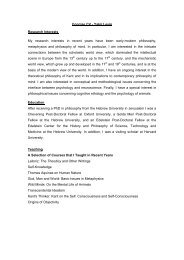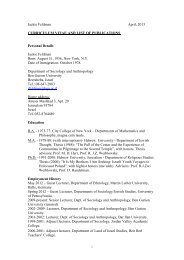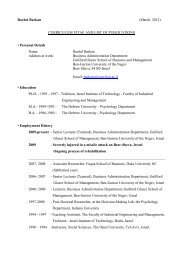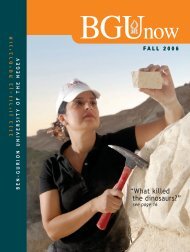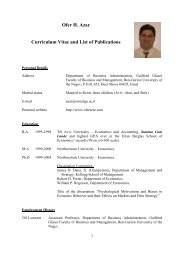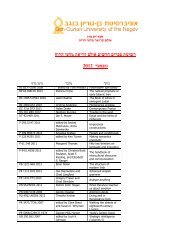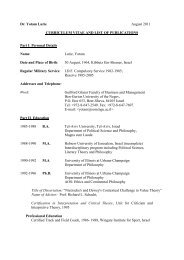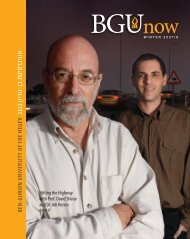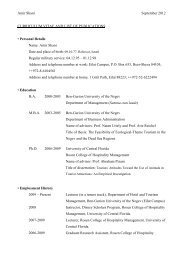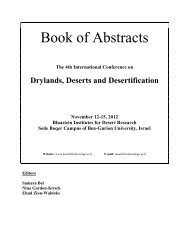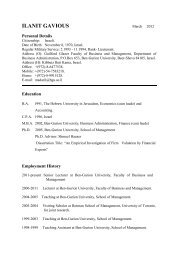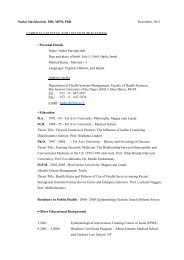Dina Van Dijk CV.pdf
Dina Van Dijk CV.pdf
Dina Van Dijk CV.pdf
You also want an ePaper? Increase the reach of your titles
YUMPU automatically turns print PDFs into web optimized ePapers that Google loves.
<strong>Dina</strong> <strong>Van</strong>-<strong>Dijk</strong> Page 12 of 13<br />
Synopsis of research, including reference to publications and grants in<br />
above lists<br />
My current research aiming to understand the role motivation plays in influencing<br />
organizational behavior and well-being. More specifically, I'm interested in how the motivationalregulatory<br />
focus affects peoples' reaction to feedback, relationship with supervisor, career choice,<br />
and their well-being and health. The following synopsis of research will describe my research<br />
agenda and achievements in the past seven years and will outlay plans for ongoing and<br />
further research.<br />
In my doctoral dissertation from the School of Business Administration of The<br />
Hebrew University in 2003, I explored how the motivational system --promotion-<br />
prevention focus -- affects the reaction of individuals to external feedback. I found that<br />
when people are motivated by a promotion focus, positive feedback encourages them to<br />
work harder than negative feedback. Conversely, when people are motivated by a<br />
prevention focus, negative feedback encourages them to work harder than positive<br />
feedback. Together with Avraham Kluger, my PhD advisor, we have shown this effect in<br />
both lab and field (refereed articles #1, #8 and scientific report #14). For this work, we<br />
received the Best Competitive Paper Award (2009) from the "OB division of the Academy<br />
of Management," Recently, we suggested some unique implications of our work that could<br />
be exclusively fit to healthcare systems (refereed article #7).<br />
My work on regulatory focus theory had extended in two other research directions:<br />
leadership and more recently, to well-Being and health. In the leadership arena, I have<br />
studied the role of regulatory focus as both mediator and moderator of the relationships<br />
between leadership style and follower outcomes. A conceptual work done together with my<br />
colleague, Ronit Kark, was published in the Academy of Management Review (refereed<br />
article #3). Later, we presented another theoretical framework in which the unit of analysis<br />
is the leader–follower dyad (chapter #13). Additionally, our work on regulatory focus and<br />
leadership was awarded the Best Paper Runner-up Award (2005) from "The International<br />
Leadership Association Scholarship Global Learning Community" and in 2011, it received<br />
the Overall Best Paper Award from the "International Academy of Management and<br />
Business." Moreover, this work had won a research grant from the Israel Science<br />
Foundation (ISF). During the last two years, we have collected data in the field and in the<br />
laboratory to test our conceptual framework. At this stage, we are working on several<br />
empirical papers which examine this framework.<br />
Another direction of my current work on regulatory focus focuses on the connection<br />
between regulatory focus and well-being. In a longitudinal field study conducted with<br />
Israeli residents exposed to heavy missile attacks during 2009, we showed that a<br />
threatening situation was related to a high level of prevention focus among the exposed<br />
population and that this level of prevention focus further mediated the relationships<br />
between the threat and the population's well-being and subjective health (submitted article<br />
#16).<br />
In the last year I spent a sabbatical year as a visiting scholar at Columbia University<br />
in New York City. I continued to work on the well-being research with Tory Higgins in his<br />
lab in the Psychology Department. During this year, we tested the role of promotion focus<br />
in buffering the negative effect of stressful events on well-being and subjective health. In<br />
addition to this research, I was able to continue my previous work on feedback with a<br />
collaboration of scholars from Columbia.<br />
Finally, since receiving my position in the Department of Health Systems<br />
Management, I have started to work on health-related issues. Specifically, I collaborated<br />
with a group of physicians aiming to develop a new investigating tool for the diagnosis of<br />
psoriasis. This new tool is a self-report questionnaire that is supposed to be completed by<br />
both the physician and the patient to give a better indication for the severity of the disease



